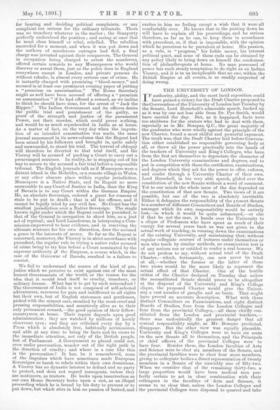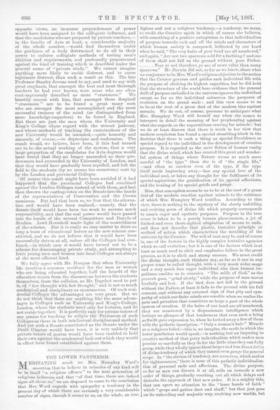THE UNIVERSITY OF LONDON.
IF authority, ability, and the most lucid exposition could have gained a victory for the Draft Charter proposed to the Convocation of the University of London last Tuesday by the Senate, Lord Herschell's admirable speech, backed up as it was by one not less able from Dr. Pye Smith, would have carried the day. But, as it happened, facts were too stubborn for the orators who had to deal with them, especially as in Mr. Bompas, Q.C., the great majority of the graduates who were wholly against the principle of the new Charter, found a most skilful and powerful exponent. The truth was, that the Draft Charter laid before Convoca- tion either established no responsible governing body at all, or threw all the power practically into the hands of the teachers of University and King's Colleges, who have from the first set themselves to depreciate the character of the London University examinations and degrees, and to put in competition with these the certificates, examinations, and degrees which they ask for the power to offer, enforce, and confer through a University Charter of their own. Lord Herschell, in his very able speech, glided over the constitution of the new Senate without a word of comment. Yet to our minds the whole issue of the day depended on the constitution of that new Senate. Two views of it are possible, but one of the two is absolutely inevitable. Either it delegates the responsibility of the present Senate to Et number of different Committees and Boards of Studies, amongst which its own responsibility would be entirely lost,—in which it would be quite submerged,—or else if that be not the case, it hands over the University to a clique of Professors who have spent as much of their energy for several years back as was not given to the actual work of teaching, in running down the examinations of the existing University, and maintaining that, without regular collegiate courses of lectures under themselves or men who teach by similar methods, no examination test is of any serious use or entitled to confer a real honour. We do not profess to say, without actual trial of the Draft Charter,—which, fortunately, can now never be tried at all,—whether the former or the latter of these two views would be the more likely to represent the actual effect of that Charter. One of the hostile critics of the Charter declared on Tuesday that unless the reconstituted Senate should prove to be altogether at the disposal of the University and King's College clique, the proposed Charter would give the Univer- sity a vast number of ganglia and no brain. That might have proved an accurate description. What with three distinct Committees on Examinations, and eight distinct Boards of Studies, four from the London Colleges and four from the provincial Colleges,—all these chiefly con- stituted from the London and provincial teachers,— there was undoubtedly the greatest danger that all central responsibility might, as Mr. Bompas predicted, disappear. But the other view was equally plausible. University and King's Colleges were to have six seats on the new Senate all to themselves, and the Principals or chief officers of the provincial Colleges were to have four. Besides these, the London faculties of Arts and Science were to elect six members of the Senate, and the provincial faculties were to elect four more members, giving to collegiate bodies a direct representation of twenty members in a Senate of the unwieldy size of fifty-two. When we consider that of the remaining thirty-two, a large proportion would have been medical men per- fectly certain to act in close combination with their colleagues in the faculties of ' Arts and Science, it seems to us clear that, unless the London Colleges and the provincial Colleges were disposed to quarrel and take opposite views, an immense preponderance of power would have been assigned to the collegiate influence, and that the candidates who are prepared by private teachers,— in the faculty of Arts at least, a considerable majority of the whole number,—would find themselves under the guidance of a body determined to do all in their power to enforce collegiate methods of testing men's abilities and requirements, and profoundly prepossessed against the kind of training which is described under the general name of " private study." We cannot imagine anything more likely to excite distrust, and to cause legitimate distrust, than such a result as this. The late Professor Stanley Jevons used to say, and used to say with great emphasis, that amongst the best and most thorough teachers he had ever known, were some who are often contemptuously described as mere " crammers." We heartily concur with him, that amongst these despised " crarnmers " are to be found a great many men who are amongst the most accomplished and the most successful trainers of the mind (as distinguished from mere knowledge-imparters) to be found in England. But these are just the men whom the University and King's College clique regard with the utmost jealousy, and whose methods of teaching the examinations of the new University would be intended,—quite honestly and sincerely, of course,—to depreciate and undermine. The result would, we believe, have been, if this had turned out to be the actual working of the system, that a very large proportion of the candidates for Arts degrees would have found that they no longer succeeded as their pre- decessors had succeeded in the University of London, and that they would have gradually been repelled, and left the field to the students (by no means too numerous) sent up by the London and provincial Colleges.
Of course this result might have been avoided if it had happened that the provincial Colleges had combined against the London Colleges instead of with them, and had thus thrown the casting-votes on the Senate into the hands of the representatives of Convocation and the Crown nominees. But had that been so, we fear that the alterna- tive evil would have been realised,—namely, that the Senate itself would have been too weak to assume much responsibility, and that the real power would have passed into the hands of the several Committees and Boards of Studies. Lord Herschell made light of the unwieldiness of the scheme. But it is really no easy matter to drive so long a team of educational horses as the new scheme con- stituted, and we do not believe that it would have been successfully driven at all, unless all the Colleges had com- bined,---in which case it would have turned out to be a scheme for discouraging private study, and attempting to force young men and women into local Colleges not always of the most efficient kind.
We fully agree with Mr. Bompas that when University life involves a common residence for the men or women who are being educated together, half the benefit of the education comes from the discussions between the students themselves, from the collision, as Mr. Bagehot used to put it, of " hot thought with hot thought," and is not so much academical and disciplinary as spontaneous. Of such resi- dential Colleges the advantages are very great. But we do not think that there are anything like the same advan- tages in Colleges such as University and King's College, London, where the students meet only for lectures, and do not reside together. It is perfectly easy for private tutors of any genius for teaching to eclipse the Professors of such Colleges as these in both intellectual discipline and method. And yet with a Senate constituted as the Senate under the Draft Charter would have been, it is very unlikely that private tutors of genius would have been enabled to bold their own against the academical lock-out which they would in effect have found established against them.



































 Previous page
Previous page